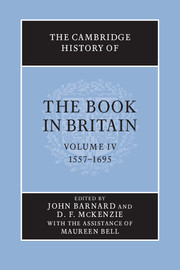Book contents
- Frontmatter
- Dedication
- Contents
- List of illustrations
- List of contributors
- Preface
- Acknowledgements
- Introduction
- RELIGION AND POLITICS
- ORAL TRADITIONS AND SCRIBAL CULTURE
- LITERATURE OF THE LEARNED
- LITERARY CANONS
- 16 Literature, the playhouse and the public
- 17 Milton
- 18 The Restoration poetic and dramatic canon
- 19 Non-conformist voices and books
- 20 Women writing and women written
- VERNACULAR TRADITIONS
- THE BUSINESS OF PRINT AND THE SPACE OF READING
- BEYOND LONDON: PRODUCTION, DISTRIBUTION, RECEPTION
- DISRUPTION AND RESTRUCTURING: THE LATE SEVENTEENTH-CENTURY BOOK TRADE
- STATISTICAL APPENDICES
- Abbreviations
- Bibliography
- Index
- Plate Section
- References
16 - Literature, the playhouse and the public
from LITERARY CANONS
- Frontmatter
- Dedication
- Contents
- List of illustrations
- List of contributors
- Preface
- Acknowledgements
- Introduction
- RELIGION AND POLITICS
- ORAL TRADITIONS AND SCRIBAL CULTURE
- LITERATURE OF THE LEARNED
- LITERARY CANONS
- 16 Literature, the playhouse and the public
- 17 Milton
- 18 The Restoration poetic and dramatic canon
- 19 Non-conformist voices and books
- 20 Women writing and women written
- VERNACULAR TRADITIONS
- THE BUSINESS OF PRINT AND THE SPACE OF READING
- BEYOND LONDON: PRODUCTION, DISTRIBUTION, RECEPTION
- DISRUPTION AND RESTRUCTURING: THE LATE SEVENTEENTH-CENTURY BOOK TRADE
- STATISTICAL APPENDICES
- Abbreviations
- Bibliography
- Index
- Plate Section
- References
Summary
Books and performance
In 1576 the actor James Burbage constructed the first purpose built public theatre in Europe since the fall of ancient Rome. Burbage’s new playhouse, situated in the district of Shoreditch in London, was called simply The Theatre. What followed from this, over the next fifty years and more, in cultural interactions of the most complex kind, was the emergence of two histories, one of material objects and the marketplace (since The Theatre was soon competing with rival playhouses in London), and the other of an eruption and opening in human consciousness manifested in and provoked by the drama that Shakespeare and his contemporaries wrote for the stage. The first history is of the physical spaces and economic conditions in which Elizabethan and Jacobean plays were performed, of the actors who played them, and the audiences who watched them. The second history is that of the plays themselves, as artefacts of words and spectacle shaped by and in turn shaping the imaginations and the psychological and social desires and needs of the dramatists and their audiences.
Other forms of human endeavour and achievement converged on this moment of public theatre, among them the resources of classical drama, poetry and rhetoric, and the conventions for the conduct of public and state ceremony in all aspects of English life, in royal courts, in the streets, and in the Church. One of the reasons for the astonishing success of the public stage was its capacity to assimilate and to exploit the many different cultural forms that were presented to it.
Keywords
- Type
- Chapter
- Information
- The Cambridge History of the Book in Britain , pp. 351 - 375Publisher: Cambridge University PressPrint publication year: 2002
References
- 1
- Cited by

